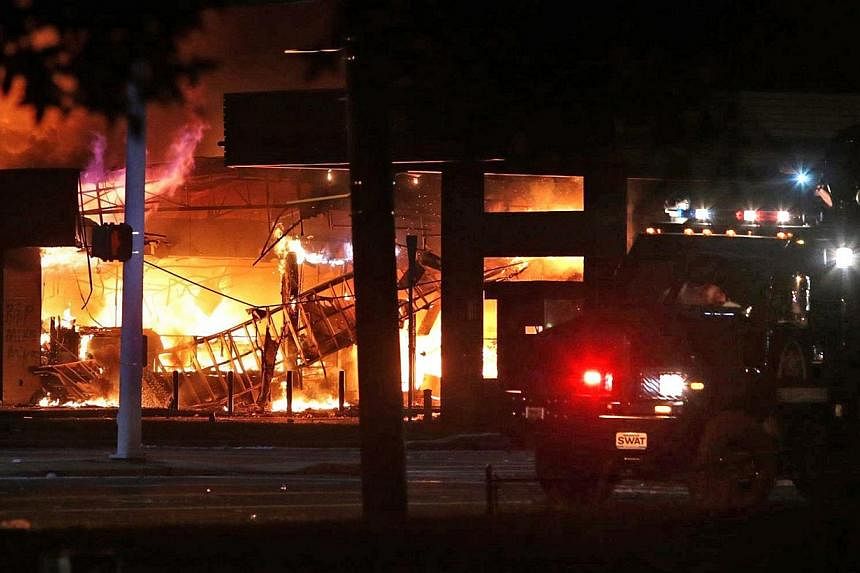WASHINGTON (AFP) - The Federal Bureau of Investigation (FBI) opened a civil rights probe on Monday after police shot an unarmed black teenager in Missouri and triggered a night of rioting and inflamed racial tensions.
Mayor James Knowles of the St Louis suburb of Ferguson promised a thorough and impartial investigation by county officials into Saturday's death of aspiring college student Michael Brown, 18.
"The only thing I can tell my community now is to remain calm," said Knowles on CNN television. "I understand the rage and anger of people, but this is not constructive."
St Louis County police said two officers were injured overnight and 32 people arrested for theft, assault or burglary in Ferguson, home to 21,000 people, two-thirds of them African-American.
Local schools cancelled what would have been their first day back after summer.
Protesters wielding placards returned to the streets on Monday where they engaged in a stand-off with a line of police. No incidents were reported.
The St Louis office of the FBI is looking into possible civil rights violations in Brown's death, alongside a separate probe undertaken by St Louis County Police, local media reported.
By law, the FBI is tasked with enforcing federal civil rights legislation and investigating suspected cases of race-based abuses by public officials.
Social media exploded on Monday with accusations that Brown had been "murdered" at the hands of Ferguson's overwhelmingly white police department, alongside condemnation of Sunday night's outburst of looting.
His death stirred comparisons to the February 2012 fatal shooting of unarmed teenager Trayvon Martin in Florida by pistol-toting neighbourhood watch volunteer George Zimmerman, who claimed he had acted in self-defence. He went on to be acquitted of murder.
It also renewed a debate about race and law enforcement, a month after the death of an asthmatic African-American father of five who was subjected to a "choke hold" by police on a New York sidewalk in full view of passers-by.
Local media in St Louis said at least a dozen businesses were targeted in Sunday's violence, including a gas station that was looted and set on fire.
The violence broke out after large crowds of mostly African-American protesters gathered Sunday for a vigil at the spot where Brown - who was to start classes at a vocational college on Monday - had been shot.
Details of Brown's death differed, however.
A witness identified as Dorian Johnson told KMOV News 4 that he had been walking with Brown when a police officer confronted them and drew his weapon.
The officer shot Brown, who "turned around and put his hands in the air," Johnson said. "He started to get down and the officer still approached with his weapon drawn and fired several more shots." But St Louis County Police chief Jon Belmar told a news conference on Sunday that Brown was killed after physically assaulting a police officer and struggling to get his weapon.
The St Louis Post-Dispatch said the incident brought to light a lingering tension between the mostly white local police force and the suburb's African-American community, which has grown in the past decade.
"The death of yet another African-American at the hands of those sworn to protect and serve the community where he lived is heartbreaking," said Cornell Williams Brooks of the NAACP civil rights organisation.
Brown's grief-stricken mother, Lesley McSpadden, told KMOV TV her son had just graduated from high school.
"Do you know how hard it was for me to get him to stay in school and graduate? You know how many black men graduate? Not many," she said.
"Because you bring them down to this type of level, where they feel like they don't got nothing to live for anyway."

